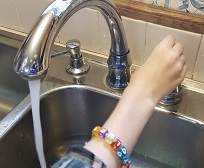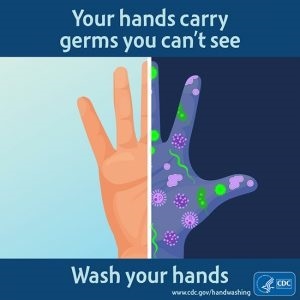
Did you know keeping your hands clean is one of the most important steps you can take to avoid getting sick and spreading germs to others? It is also the easiest and cheapest way too. Hands are of the most common ways that the virus spreads from one person to the next. These germs and viruses are spread by not washing your hands properly with soap and clean running water. Respiratory viruses like coronavirus disease (COVID-19) spread when mucus or droplets containing the virus get into your body through your eyes, nose or throat. Most often, this happens through your hands. During this global pandemic of COVID-19 individuals are realizing the importance of washing their hands properly along with other steps to help us stay safe.
Prevent the Spread of COVID-19 or Any Virus
Be aware of the following:
Important Fact:

Here is one reason we should wash our hands after we go to the restroom or change a diaper. Did you know a single gram of human feces (about the weight of a paper clip), can contain one trillion germs? Wow, just think these germs are on your hands and if they are not washed off, they can be passed from person to person and make people sick.
Stop and Think!
Take time to wash your hands to prevent illnesses and spread of infection to others!
Proper Handwashing Steps:
- Wet your hands and apply enough soap to create a good lather.

Handwashing Steps - Lather your hands by rubbing them together with the soap. Be sure to lather the backs of your hands, front of your hands, between your fingers, and under your nails.
- Scrub your hands for at least 20 seconds. What equals 20 seconds? Sing the “Happy Birthday” song quietly in your head, from beginning to end, twice.
- Rinse your hands and wrists thoroughly under clean, running water.
- Dry your hands using a clean paper towel or air dry them.
Wash Your Hands Before……
- Preparing and eating foods

Wash your hands before and after eating. Picture of a table setting. - Taking care of someone who is sick
- Treating a cut or wound
- Drinking
- Touching your mouth or face
Wash Your Hands After….

- Using the restroom
- Coughing, sneezing or blowing your nose
- Handling garbage or trash
- Taking care of someone who is sick
- Treating a cut or wound
- Touching and preparing foods
- Working, gardening, or playing outside
- Changing baby diapers
- Petting an animal, or touching animal food or waste
Benefits of Handwashing Education in the Community:
- Reduces the number of people who get sick with diarrhea by 23-40%.1,3,6
- Reduces diarrheal illness in people with weakened immune systems by 58%.4
- Reduces respiratory illnesses, like colds, in the general population by 16-21%.3,4
- Reduces absenteeism due to gastrointestinal illness in schoolchildren by 29-57%. 6
Practice good handwashing techniques like Ally does in the Basic Handwashing videohttps://youtu.be/uTGFvOJkkKk and Stay Safe!
For more information contact your local UF/IFAS Extension Office http://sfyl.ifas.ufl.edu/find-your-local-office/
REFERENCES
CDC (Center for Disease Control and Prevention)
Proper Handwashing for Caregivers, Elderly, Food Handlers and School Children: https://sfyl.ifas.ufl.edu/alachua/family–consumer-sciences/family–consumer-sciences-special-topics/healthnutrition–food-systems/
Percentages from: CDC 24/7: Saving Lives, Protecting People. Handwashing: Clean Hands Save Lives. Handwashing in Community Settings…..Show Me the Science https://www.cdc.gov/handwashing/why-handwashing.html
- Ejemot RI, Ehiri JE, Meremikwu MM, Critchley JA. Hand washing for preventing diarrhoea.external iconCochrane Database Syst Rev. 2008;1:CD004265.
- Aiello AE, Coulborn RM, Perez V, Larson EL. Effect of hand hygiene on infectious disease risk in the community setting: a meta-analysis.external iconAm J Public Health. 2008;98(8):1372-81.
- Huang DB, Zhou J. Effect of intensive handwashing in the prevention of diarrhoeal illness among patients with AIDS: a randomized controlled study.external iconJ Med Microbiol. 2007;56(5):659-63.
- Rabie T and Curtis V. Handwashing and risk of respiratory infections: a quantitative systematic review.external iconTrop Med Int Health. 2006 Mar;11(3):258-67.
- Freeman MC, Stocks ME, Cumming O, Jeandron A, Higgins JPT, Wolf J et al.Hygiene and health: Systematic review of handwashing practices worldwide and update of health effects.external icon Trop Med Int Heal 2014; 19: 906–916.
- Wang Z, Lapinski M, Quilliam E, Jaykus LA, Fraser A. The effect of hand-hygiene interventions on infectious disease-associated absenteeism in elementary schools: A systematic literature review.external iconAm J Infect Control 2017; 45: 682–689.
 0
0

